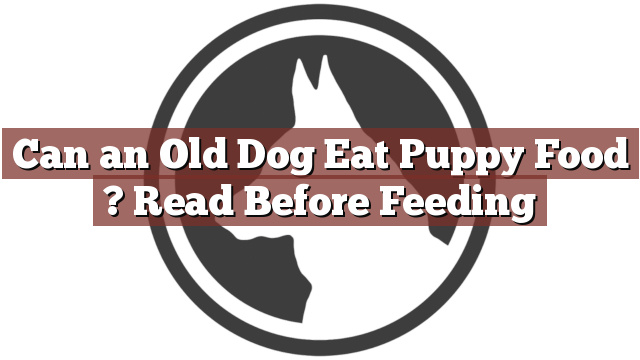Understanding Your Dog’s Dietary Needs
As responsible pet owners, it is crucial to understand our dog’s dietary needs. A well-balanced and appropriate diet is essential for their overall health and well-being. Dogs require a combination of proteins, carbohydrates, fats, vitamins, and minerals to thrive. The age, size, breed, and activity level of your dog also play a significant role in determining their specific nutritional requirements.
Can an Old Dog Eat Puppy Food? Read Before Feeding
One common question that arises when it comes to dog nutrition is, "Can an old dog eat puppy food?" The answer is both yes and no. Puppy food is specially formulated to meet the high energy needs of growing puppies. It contains higher levels of protein, fat, and calories to facilitate their rapid growth and development. On the other hand, older dogs have different nutritional needs. They require a diet that is lower in calories, protein, and fat to prevent excessive weight gain and potential health issues.
Pros and Cons of Feeding Puppy Food to an Older Dog
Feeding puppy food to an older dog can have both pros and cons. The higher protein content in puppy food can be beneficial for older dogs with certain health conditions, such as muscle loss or decreased appetite. Additionally, the increased fat content can provide additional energy for seniors with a decreased activity level. However, it is crucial to note that excessive protein and fat can put a strain on the liver and kidneys of older dogs, leading to potential health problems.
Another aspect to consider is the potential for weight gain. Older dogs are more prone to obesity, and the higher calorie content in puppy food can contribute to unwanted weight gain. This can lead to various health issues, including diabetes, joint problems, and heart disease. Therefore, it is essential to monitor your older dog’s weight closely and adjust their diet accordingly to maintain a healthy body condition.
Conclusion: Considerations for Feeding Puppy Food to Older Dogs
In conclusion, while an old dog can eat puppy food, it is not always the best choice. The specific needs of your older dog should be taken into consideration before making dietary changes. Consulting with your veterinarian is highly recommended to determine the most suitable diet for your senior companion. They can provide valuable guidance and recommend appropriate food options that meet your dog’s individual nutritional requirements. Remember, the health and well-being of your furry friend should always be the top priority.
Thank you for taking the time to read through our exploration of [page_title]. As every dog lover knows, our furry friends have unique dietary needs and responses, often varying from one canine to another. This is why it's paramount to approach any changes in their diet with caution and knowledge.
Before introducing any new treats or making alterations to your dog's diet based on our insights, it's crucial to consult with a veterinarian about [page_title]. Their expertise ensures that the choices you make are well-suited to your particular pet's health and well-being.
Even seemingly harmless foods can sometimes lead to allergic reactions or digestive issues, which is why monitoring your dog after introducing any new food item is essential.
The content provided here on [page_title] is crafted with care, thorough research, and a genuine love for dogs. Nevertheless, it serves as a general guideline and should not be considered a substitute for professional veterinary advice.
Always prioritize the expert insights of your veterinarian, and remember that the health and happiness of your furry companion come first.
May your journey with your pet continue to be filled with joy, love, and safe culinary adventures. Happy reading, and even happier snacking for your canine friend!

